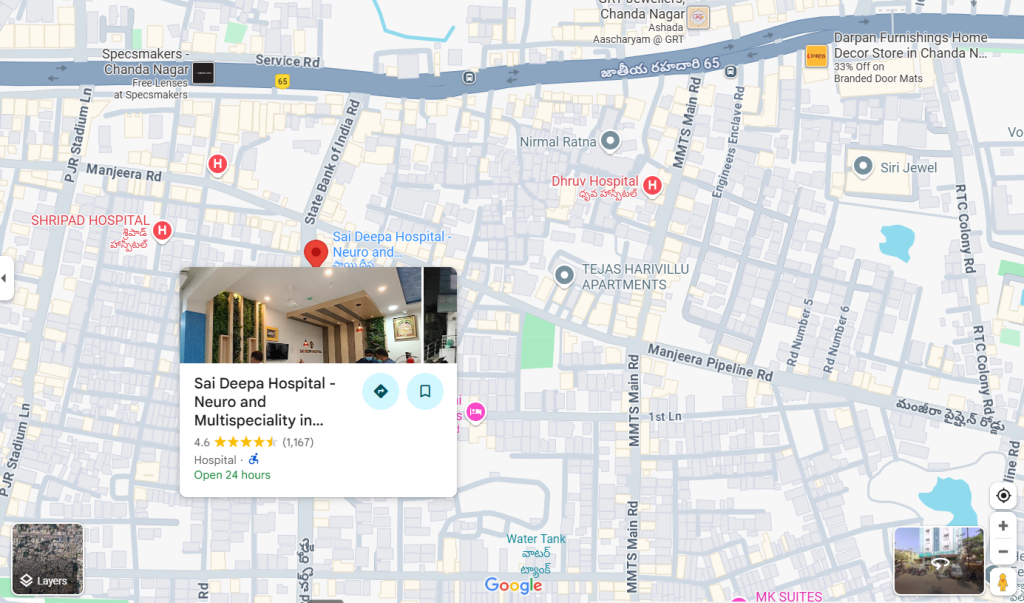Best Microscopic Surgery Treatment in Hyderabad
- Home
- Best Microscopic Surgery Treatment in Hyderabad
Best Microscopic Surgery Treatment in Hyderabad
In today’s advanced medical world, surgeries have become more precise, less invasive, and faster to heal from – thanks to techniques like microscopic surgery. At hospitals like Sai Deepa Hospital, microscopic surgeries have transformed the way we treat complex conditions, especially in areas like neurosurgery, ENT, spine, and vascular procedures.
Book Free Appointment
1L+
Happy Customers
25+
Qualified Doctors
50
Rooms
5000+
Successful Surgeries
Free
Consultation
24/7 Ambulance
Facility
Insurance
Claim Support
What Is Microscopic Surgery?
Microscopic surgery is a highly specialized procedure performed using an operating microscope, which magnifies tiny anatomical structures such as nerves, blood vessels, or tissues. This technique allows surgeons to work with extreme precision, minimizing damage to surrounding healthy tissues.
These surgeries are typically less invasive, involve smaller incisions, and offer quicker recovery compared to traditional open surgeries.

Dr. Sasidhara Roa A
MBBS, MS
5000+ Successful Surgeries
11+ Years of experience
Dr. Sasidhara Rao A. is an experienced General and Laparoscopic Surgeon at Sree Sai Deepa Hospitals, Chandanagar, with over 11 years of expertise and 5000+ successful surgeries. He specializes in laparoscopic, laser, and microscopic surgeries, treating conditions like piles, fissures, varicose veins, and gallbladder issues.
Doctor’s Fellowships:
Fellowship - International Society of Coloproctology
Fellowship in Intimate Health
Fellowship in Diagnostic Endoscopy
What Are the Types of Microscopic Surgery?
Microscopic surgery is used in multiple specialties. Here are some of the most common types:
- Microscopic Neurosurgery
Used to treat brain tumors, spinal disorders, and nerve compressions with extreme accuracy. - Microscopic ENT Surgery
Procedures like ear reconstructions (e.g., tympanoplasty), sinus surgeries, and vocal cord treatments. - Microscopic Spine Surgery
Treats herniated discs, spinal stenosis, and nerve root decompression with minimal invasion. - Microscopic Vascular Surgery
Used to repair or bypass tiny blood vessels, especially in cases like varicose veins or AV malformations.
Microscopic Urological Surgery
Treats infertility issues, varicoceles, and reconstructive urology.
What Does Microscopic Surgery Treat?
Microscopic surgery is often used to treat:
- Brain tumors and spinal cord injuries
- Herniated discs and spinal stenosis
- Nerve compression syndromes (like carpal tunnel)
- Ear problems such as perforated eardrums or cholesteatoma
- Varicose veins and microvascular conditions
- Male infertility or testicular vein issues
By magnifying the target area, surgeons can remove tumors, repair tissues, and resolve blockages or damage with better outcomes.
What Happens Before, During, and After the Microscopic Surgery Procedure?
Before Surgery:
- You’ll meet with the surgeon for evaluation and imaging (MRI, CT, or ultrasound).
- You may be asked to fast for a few hours before surgery.
- Informed consent will be taken, and the procedure will be explained in detail.
During Surgery:
- Performed under general or local anesthesia depending on the case.
- A small incision is made, and the operating microscope is positioned.
- Using miniature tools, the surgeon performs the procedure with precision while watching a magnified view.
After Surgery:
- You will be shifted to a recovery room for monitoring.
- Pain is usually minimal and controlled with medication.
- Most patients can resume light activities within a few days, depending on the type of surgery.
Get your surgery cost
Does Microscopic Surgery Hurt?
Most microscopic surgeries are less painful than traditional open surgeries. Since incisions are smaller and tissues are minimally disturbed, patients often experience:
- Less post-operative discomfort
- Reduced swelling and scarring
- Faster recovery times
You may feel mild pain or soreness, which is easily manageable with prescribed medication.
How Long Does It Take to Recover from Microscopic Surgery?
Recovery time varies depending on:
- Type of procedure
- Area of the body treated
- Your general health
On average:
- Minor ENT or urology microscopic surgeries: 1–2 days
- Spine or neuro procedures: 1–2 weeks for light activity, full recovery in 4–6 weeks
Most patients return to work and daily routines much sooner compared to traditional surgeries.
Accreditations

Saideepaneurocare Hospitals is NABH certified, a mark of excellence in patient safety and care. We follow stringent healthcare protocols and maintain world-class hygiene standards.

We are ISO 9001 certified, ensuring the highest standards in quality management and patient care. This certification reflects our commitment to efficient processes and continuous improvement in healthcare services.
What Are the Risks of Microscopic Surgery?
While microscopic surgeries are generally safe and have fewer complications, some risks may include:
- Infection at the incision site
- Bleeding or hematoma
- Nerve damage (rare)
- Reaction to anesthesia
- Failure to fully resolve the issue (depending on condition severity)
At expert centers like Sai Deepa Hospital, these risks are minimized by experienced surgeons and advanced sterile techniques.
What Results Should I Expect After Microscopic Surgery?
Microscopic surgery often provides excellent long-term outcomes, especially when performed by trained specialists. Patients can expect:
- Resolution or significant relief from the problem
- Minimal scarring
- Shorter hospital stays
- Faster return to daily activities
- Improved quality of life
Follow-up visits are crucial to track your healing and prevent recurrence.
Sai Deepa Hospital - Neuro and Multispeciality
Plot no 387, Church road, Huda colony, Chanda Nagar, Hyderabad – 500050
Which is the Best Microscopic Surgery Hospital in Hyderabad?
At Sai Deepa Hospital – Neuro & Multispeciality, we specialize in advanced surgical procedures like:
- Microscopic Neuro & Spine Surgeries
- ENT Microsurgeries
- Laser and Laparoscopic Interventions
– Highly qualified surgeons
– State-of-the-art OT and microscope systems
– Affordable, patient-centric care
– Excellent post-op support and recovery guidance
Book a Consultation Today!
If you or your loved one is facing a neuro, ENT, or spine-related condition, don’t delay care. Explore the benefits of microscopic surgery with our expert team at Sai Deepa Hospital.
📍 Sai Deepa Hospitals, Chanda Nagar, Hyderabad
📞 Call or WhatsApp: +91-7093762716
🌐 www.saideepaneurocare.com
Patient Reviews



FAQ's on Microscopic Surgery
1. What are microscopic surgeries?
Microscopic surgeries are specialized procedures performed using a high-powered operating microscope. These surgeries allow the surgeon to view and operate on very small structures such as nerves, vessels, or soft tissues with extreme precision, leading to better outcomes, smaller incisions, and quicker recovery.
2. Is microscopic surgery safe?
Yes, microscopic surgery is generally considered very safe, especially when performed by experienced surgeons in advanced medical centers like Sai Deepa Hospital. The precision involved reduces the risk of damaging surrounding tissues and lowers the chances of complications.
3. How is microscopic surgery done?
Microscopic surgery is done using an operating microscope and miniature surgical instruments. The surgeon makes a small incision to access the affected area, then performs the procedure while viewing magnified structures on a screen. This technique is commonly used in neurosurgery, ENT, spine, and vascular surgeries.
4. What are the different types of surgical microscopes?
There are several types of surgical microscopes, including:
Operating Microscopes (for neurosurgery, ENT, ophthalmology)
Dental Microscopes
Spine Surgery Microscopes
ENT Microscopes
Handheld or Portable Microscopes
Each type is designed for specific procedures and magnification needs.
5. What are the risks of microscopic surgery?
Although rare, possible risks include:
Infection at the incision site
Minor bleeding or hematoma
Damage to nearby structures or nerves
Reaction to anesthesia
Incomplete resolution of the condition
Choosing a reputed hospital and experienced surgeon minimizes these risks.
6. What is the success rate of microscopic surgery?
The success rate of microscopic surgeries is very high, often exceeding 90–95%, depending on the condition being treated and the surgeon’s experience. At Sai Deepa Hospital, we maintain high standards and excellent patient outcomes through expert care and technology.
7. What is the cost of microscopic surgery?
The cost depends on the type of surgery, complexity, and hospital facilities. On average, microscopic surgeries are cost-effective in the long run due to faster recovery, shorter hospital stays, and fewer complications. At Sai Deepa Hospital, we offer affordable packages and flexible payment options.


